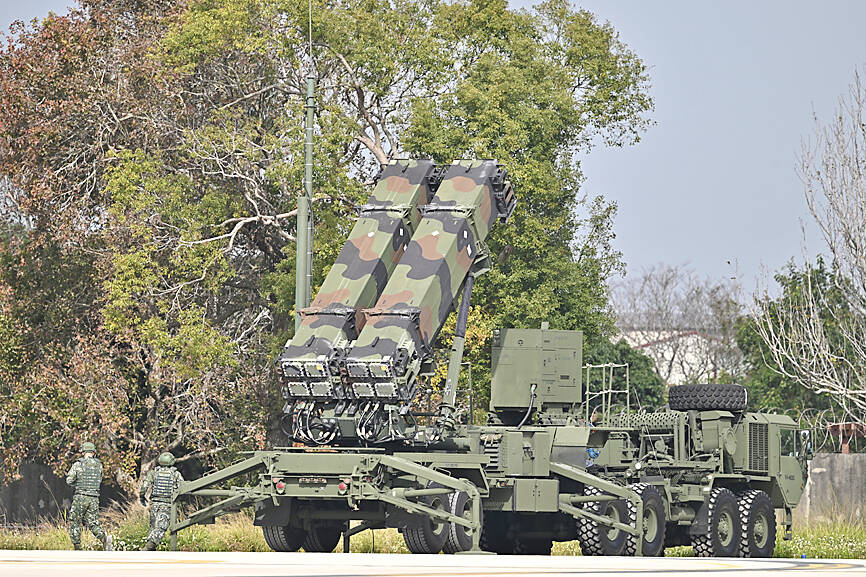The air force is to form its fourth Patriot missile-armed air defense battalion in anticipation of arms deliveries from the US this year and next, a source said on condition of anonymity yesterday.
The Ministry of National Defense has funded the procurement of PAC-3 Missile Segment Enhancement (MSE) systems with the surplus in the defense budget designated for purchasing a less-advanced version of the weapon, the source said.
Taiwan ordered hundreds of PAC-3 MSE systems and is likely to deploy them to defend the airspace over Hualien and Taitung counties, the source said.

Photo: Aaron Tu, Taipei Times
The systems have an estimated maximum altitude of between 45km and 60km, in comparison to the 24km maximum altitude of the PAC-3 system’s baseline variant, they said.
PAC-3 MSE systems have achieved superior performance by using larger, more powerful rockets, which reduce the number of missiles each launch vehicle could carry to 12, down from 15 previously, the source said.
The US is also expected to deliver the first of the three National Advanced Surface-to-Air Missile Systems (NASAMS) Taiwan ordered by the end of the year, the ministry said in February.
NASAMS could engage aerial targets as high as 40km, providing Taiwan with a medium-altitude air defense capability.
The air force is in the process of forming a battalion-level unit to deploy these weapons, the source said.
Separately, the US-based Aviation Week Network last week reported that Taiwan’s international drone-making alliance has quadrupled its membership to more than 200 companies since it was founded in September last year.
The Taiwan Excellence Drone International Business Opportunities Alliance was launched in a bid to align with US requirements to decouple drone supply chains from China, the US outlet cited Aerospace Industrial Development Corp chairman Hu Kai-hung (胡開宏), who also chairs the alliance, as saying.
Members are required to prove the provenance of their components, Hu said.
The alliance includes indigenous drone makers such as Geosat Aerospace & Technology and Thunder Tiger Group, as well as suppliers specializing in the manufacture of key components in drones, he said.
Taiwan faces challenges competing with China’s virtual monopoly over the sector, he added.
“Taiwan is a latecomer to the drone sector, but it can leverage its advanced technology and manufacturing capabilities to cooperate with a growing number of countries that want a reliable alternative to China,” Hu was quoted as saying.
The alliance has partners in the US and eastern Europe, including Estonia, Latvia, Lithuania and Poland, he said.
These nations make ideal partners because they have experience supporting Ukraine in its ongoing war against Russian aggression in a demonstration of their an antipathy to authoritarian expansionism, Hu was cited as saying.
Some of the alliance’s European members have been involved in autonomous military drones, he said.
Taiwan has been looking for manufacturers in Asia that have become wary of being dependent on Chinese drone suppliers, he said.
The alliance is increasingly confident with the security of its supply chains save for rare earths and other crucial materials, which remain under China’s control, Hu said.
Beijing’s weaponization of its control over rare earths and other resources in its trade war with the US is worrisome, he said, adding that some key raw materials utilized in drone making cannot easily be replaced if China cuts off its supply to Taiwan.

Several Chinese Nationalist Party (KMT) officials including Chairman Eric Chu (朱立倫) are to be summoned for questioning and then transferred to prosecutors for holding an illegal assembly in Taipei last night, the Taipei Police said today. Chu and two others hosted an illegal assembly and are to be requested to explain their actions, the Taipei City Police Department's Zhongzheng (中正) First Precinct said, referring to a protest held after Huang Lu Chin-ju (黃呂錦茹), KMT Taipei's chapter director, and several other KMT staffers were questioned for alleged signature forgery in recall petitions against Democratic Progressive Party (DPP) legislators. Taipei prosecutors had filed

Taiwan would welcome the return of Honduras as a diplomatic ally if its next president decides to make such a move, Minister of Foreign Affairs Lin Chia-lung (林佳龍) said yesterday. “Of course, we would welcome Honduras if they want to restore diplomatic ties with Taiwan after their elections,” Lin said at a meeting of the legislature’s Foreign Affairs and National Defense Committee, when asked to comment on statements made by two of the three Honduran presidential candidates during the presidential campaign in the Central American country. Taiwan is paying close attention to the region as a whole in the wake of a

NEW WORLD: Taiwan is pursuing innovative approaches to international relations through economics, trade and values-based diplomacy, the foreign minister said Taiwan would implement a “three-chain strategy” that promotes democratic values in response to US tariffs, Minister of Foreign Affairs Lin Chia-lung (林佳龍) said. Taiwan would aim to create a “global democratic value chain,” seek to capitalize on its position within the first island chain and promote a “non-red supply chain,” Lin was quoted as saying in the ministry’s written report to the Legislative Yuan submitted ahead of the legislature’s Foreign Affairs and National Defense Committee meeting slated for today. The Ministry would also uphold a spirit of mutual beneficial collaboration, maintaining close communication and consultations with Washington to show that Taiwan-US cooperation

Taiwan and the US have begun trade negotiations over tariffs imposed by US President Donald Trump earlier this month, Minister of Foreign Affairs Lin Chia-lung (林佳龍) said in an interview this morning before reporting to the Legislative Yuan’s Foreign Affairs and National Defense Committee. The Taipei Economic and Cultural Representative Office (TECRO), Taiwan’s de facto embassy in the US, has already established communication channels with the US Department of State and the US Trade Representative (USTR), and is engaging in intensive consultations, he said. Points of negotiation include tariffs, non-tariff trade barriers and issues related to investment, procurement and export controls, he